DC Superior Court Adopts Practice Standards for Guardians ad Litem in Custody and Related Consolidated Cases
The Superior Court of the District of Columbia issued an administrative order on January 24, 2014 to release Practice Standards for Guardians ad Litem (GAL) in Custody and Related Consolidated Cases. These practice standards were developed by the Family Court Domestic Relations GAL Standards Committee in consultation with representatives from the bench, the bar, and local community-based organizations that provide legal representation in Family Court.
These standards apply to attorneys who are court-appointed to represent and advocate for the child’s best interests in custody and related consolidated cases involving domestic violence, the dissolution of a marriage, separation, and parentage proceedings, and in issues related to legal and/or physical custody/placement, parenting plans, access and/or visitation, and child support and maintenance.
The Council for Court Excellence has been involved in these issues for some time. In July 2011, CCE submitted to DC Superior Court Proposed District of Columbia Practice Standards for Lawyers Representing Children in Custody, Visitation and Other Domestic Relations Branch Cases. CCE had formed a project committee in March 2010 to develop the proposed practice standards for court-appointed lawyers for children in custody disputes, because at that time, there were no uniform procedures or practice standards to guide those attorneys in contested custody cases.
The CCE project committee, comprised of legal services attorneys, pro bono counsel and the private bar, reached consensus on all but two issues within the proposed standards. The first issue addressed whether court-appointed attorneys for children in custody cases should be required to submit a written report to the court. The majority believed that such reports are inappropriate, citing due process and evidentiary concerns, while the minority position required the attorney to file at least one report. The second issue involved the role of a supervisor for a court-appointed attorney. The majority held that the mentorship model in the pro bono legal community is sufficient and that requiring supervision by the mentor is unnecessary. The minority believed that supervision by an experienced family law practitioner is necessary.
The court acknowledged CCE’s proposed standards, but subsequently convened its own committee to develop GAL standards for custody cases. The court’s practice standards take CCE’s minority positions, requiring the assignment of a mentor or supervisor with family law experience and make the GAL’s report submission permissive. And unlike CCE’s proposed standards, the court’s standards do not distinguish between roles of lawyers representing children in custody, visitation and other domestic relations matters. The court’s standards, instead, focus only on the role of the guardian ad litem.
These standards have been long-awaited since they were mandated in the Family Court Act of 2001, and CCE is pleased that the court has adopted practice standards, as directed under D.C. Code Section 11-1103, to guide court-appointed lawyers representing children in custody disputes.


